Marcelle Waldon declines to mount a defense to avoid death as victims' family speaks
The jury in the trial of Marcelle Jerrill Waldon is expected to start deliberations Tuesday after the convicted murderer declined to mount a defense in the sentencing phase Monday, against the advice of his attorneys and the judge.
The jury will recommend either the death penalty or life in prison without parole for the murders of former City Commissioner Edie Yates Henderson and David Henderson in their Lake Morton home in November 2020.
On Wednesday, the same jury convicted Waldon, 39, of the horrific murders of the Hendersons. The prominent Lakeland couple had been stabbed 23 times with a large kitchen knife missing from their kitchen butcher block, the prosecution said at trial.
Waldon also was convicted of burglary of a dwelling with assault, assault and battery while armed with a firearm, two counts of kidnapping, robbery with a firearm, attempted arson, arson, grand theft of a motor vehicle and tampering with physical evidence. Another charge of forgery was thrown out.
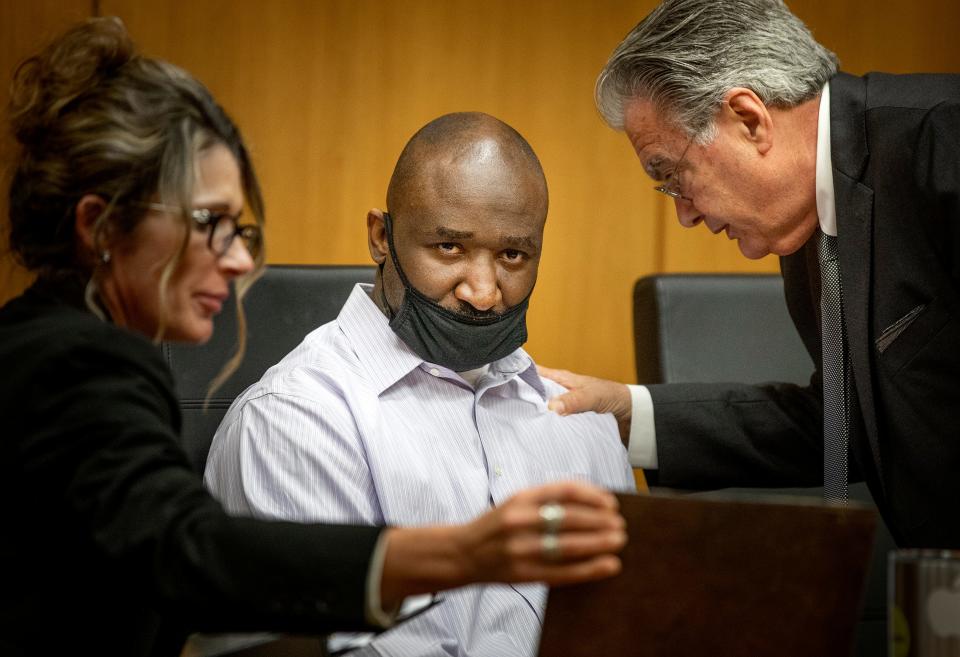
During the trial phase, the prosecution said that Waldon stole valuable items from Hendersons and then stabbed them to death to cover up the crimes. He was also convicted of attempting to burn down the home and torching the husband’s car. Other items missing from the home included jewelry, credit cards, bank checks and the husband’s white Audi A6.
The penalty phase of the double murder trial began Monday in Bartow with the prosecution presenting evidence for the jury to consider sentencing. The victims' family members also presented victim-impact statements to the jury.
But in an unexpected twist, Waldon waived his right to put on evidence to mitigate the prosecution’s aggravating factors, which they presented to sway the jury toward a death sentence.
Circuit Judge J. Kevin Abdoney repeatedly informed Waldon of his right to provide testimony and evidence of mitigating circumstances in this case.
“I don’t think it is a good idea to waive mitigation,” he told Waldon. He added that Waldon was going against the advice of his defense attorneys and also polled the lawyers, who also said their advice was to present mitigating circumstances to counter the prosecution.
Abdoney asked Waldon whether he had had any mental or psychological issues over the weekend or if he was hearing voices? Further, the judge asked if Waldon was taking any alcohol or medicine, or had anyone made promises to him or threatened him as potential reasons for his decision.
Waldon said no to the judge’s questions and affirmed that he wanted to waive mitigation.

A doctor who had flown into Orlando on Tuesday morning was among those waiting outside the courtroom expecting to testify about aspects of Waldon's background before the killings. Testimony was expected about childhood trauma suffered by Waldon and a head injury that left him with an intellectual disability.
But Waldon insisted on waiving his right to mitigate before the prosecution presented its evidence to the jury. He then again waived his right to mitigate after the Assistant State Attorney Michael Nutter had rested the prosecution’s case for imposing the death penalty.
Defense attorney Daniel Hernandez had little evidence to give to the jury to use to potentially outweigh the prosecution’s aggravating circumstances other than any potential evidence presented during the earlier phase of the trial.
He told the jury in a brief statement that his client had “knowingly and voluntarily” made the decision not to present mitigating circumstances. As a defense attorney, this put him in an “extremely unpleasant” position as he would be asking the jury “to save a person’s life.”
Hernandez also told the judge that the prosecution had not proved that the defendant should be put to death for the murders. But Abdoney denied the motion.
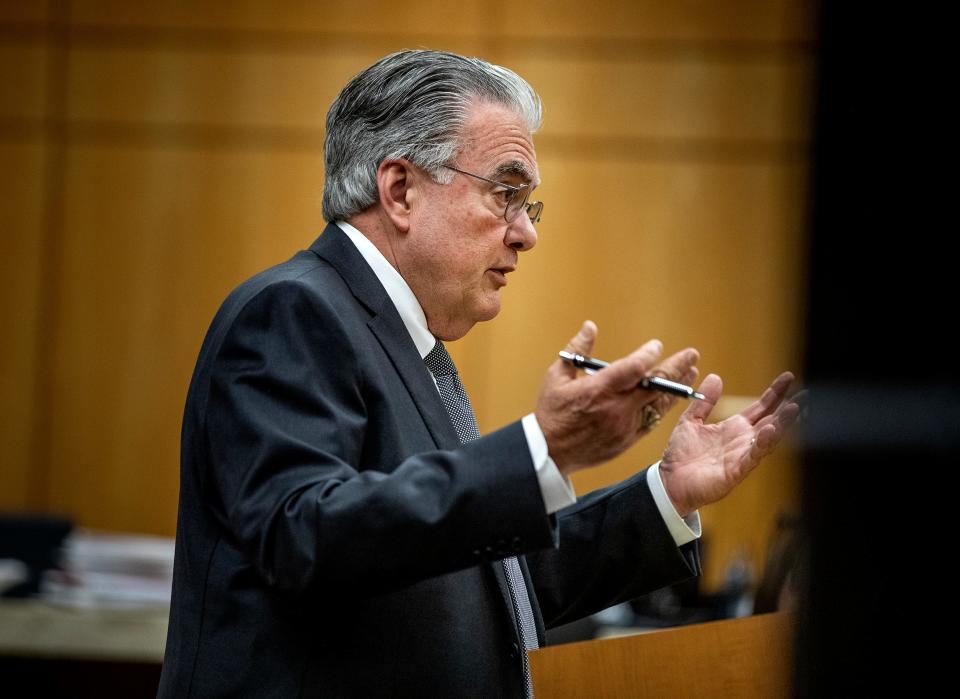
Nutter, during his opening statement, said the state of Florida only needed to prove one aggravating factor beyond a reasonable doubt to warrant a death verdict from the jury. But, he said, but the prosecution would meet six factors.
The first-degree murders were particularly heinous, cold and calculated in nature, he said. And he said the aggravating factors would outweigh any potential mitigation.
He stated a similar version of the aggravating factors that the State Attorney’s Office had filed in December 2020, saying the prosecution intended to pursue the death penalty, including the defendant was a convicted felon, he engaged in a kidnapping prior to the murders, he killed the Hendersons to avoid arrest, and the murders were heinous, atrocious, cold and calculated.
“We will prove each of these aggravating factors,” he said and called just one witness.
He recalled forensic pathologist Vera Volnikh to the witness stand and went over the nature of the injuries that caused the deaths of the Hendersons with her. In addition to the graphic nature of the injuries the couple suffered, including stab wounds so deep that their hearts, lungs and aortas were perforated, she let the jury know their deaths were slow and painful.
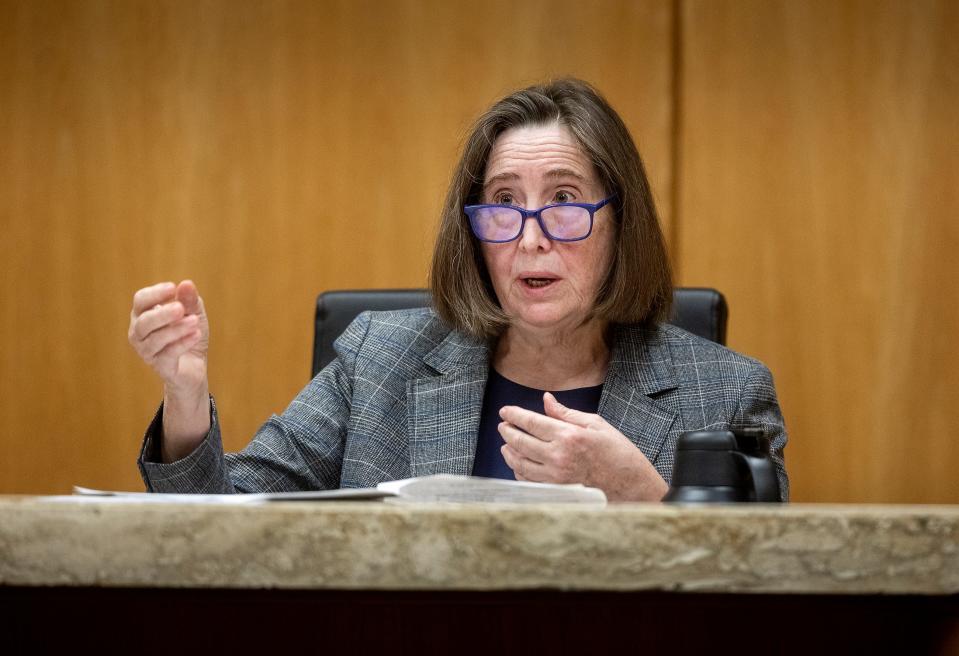
The Hendersons likely lost consciousness within a few minutes of suffering painful stab wounds because of the amount of blood loss and were brain dead within 10 minutes, Volnikh said.
As the pathologist went over the damage to skin tissue, muscle and bone, she was asked by Nutter: “Is there a certain degree of pain associated with these wounds?”
“Yes, there would have been a lot of pain,” she said. She added, the pain would have been felt from the skin to the internal organs as nerves run throughout the body.
“It’s a slow death,” Volnikh said. “In the end, she would have died from blood loss.”
Because Edie Henderson was stabbed as she was lying her back, she would have seen the assailant stabbing her with the knife, Volnikh affirmed when asked by Nutter.
She repeated many of the same causes of death for David Henderson, who was found lying face down with stab wounds on his back and neck, including a stab wound that severed his spine.
Volnikh said once his vertebrate had been severed near his neck, he would not have felt the pain in his back, but would have been conscious of what was going on for a few minutes before he became unconscious from the amount of blood loss.
The most emotional moments on Monday came as friends and family members of the victims gave statements to the jury, including Todd Baylis and his wife, Will Henderson and Edie Henderson’s brother.
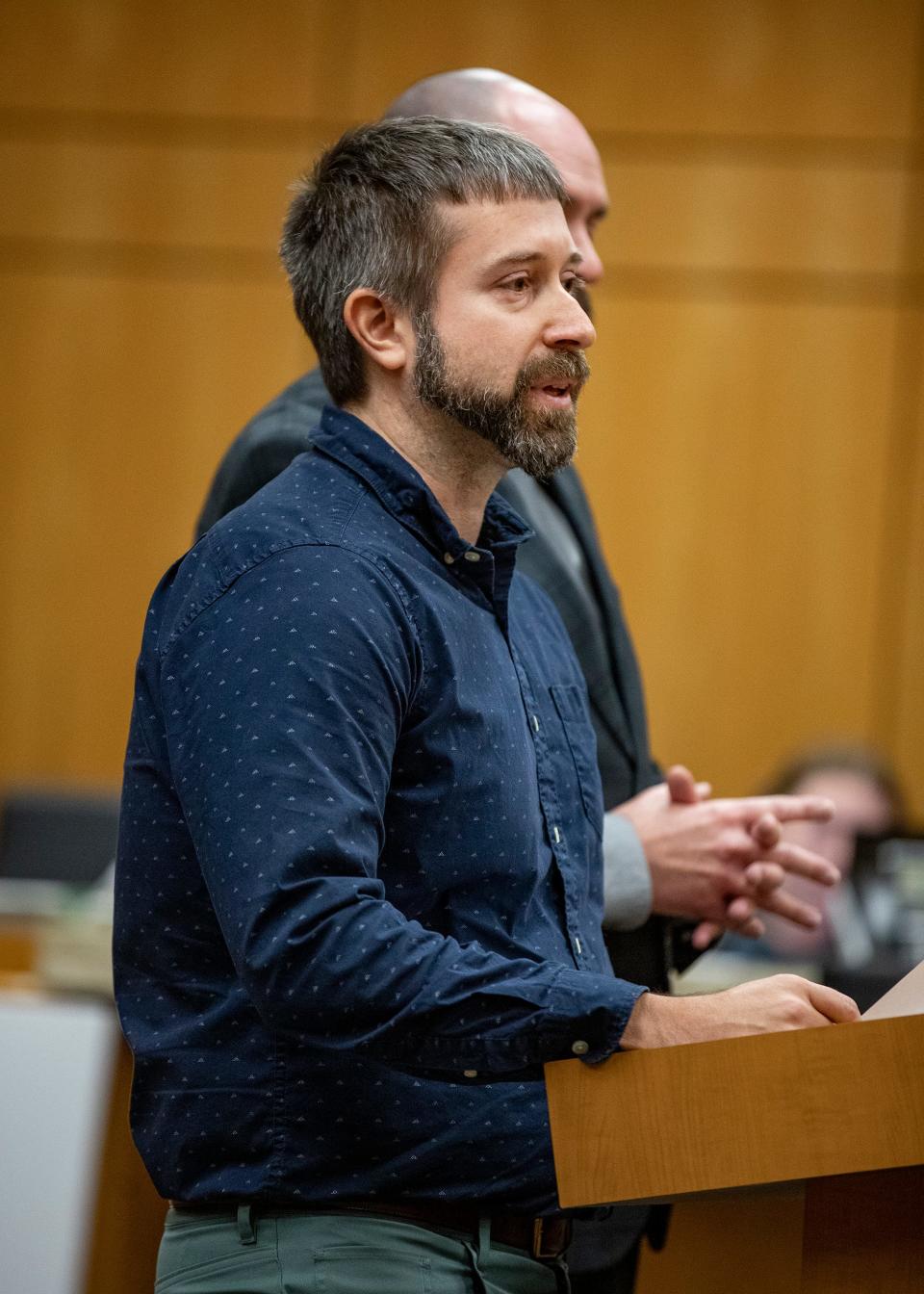
“Nov. 10, 2020, the community lost the wisdom, knowledge and service of two leaders who loved to serve their community and countless people throughout their lives,” said Baylis, Edie Henderson’s son.
“Personally, our community and our family’s lives were forever changed,” Baylis said. “Not only have we lost an important part of our family and our kids’ grandparents, but also our mentors, partners and friends.
“We will forever live with the horrors of that loss; the circumstances around it; the what-ifs of that day; and the ongoing trauma that we will inevitably one day have to explain to our young children,” he said.
The family has been searching for a “sense of security” ever since and every day there are reminders of what happened, Baylis said.
“It’s been a daily struggle to remember our parents as they lived and not as they died,” he said. “We respect and appreciate the process, but no amount of justice can bring back what the community has lost ....”
While others speak of closure, there may never be closure for him and his family, he said.
His wife, Sarah Baylis, said her kids were ages 2 and 5 when the murders happened.
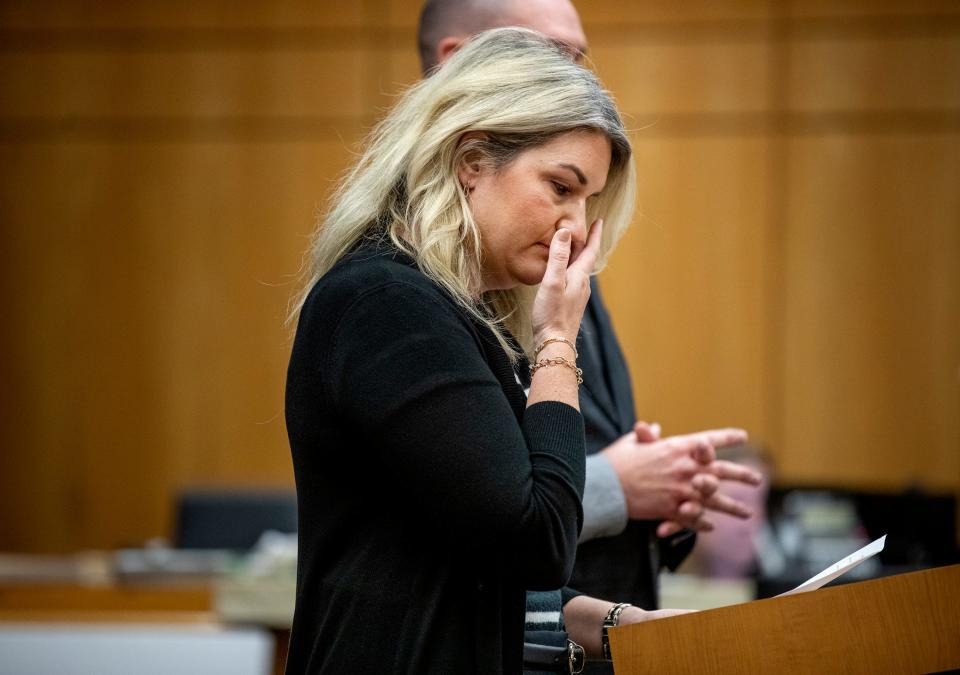
“That is all they got with their grandparents,” she said, adding every milestone, every birthday since then had been without the presence of their grandparents.
“They were a huge part of our lives,” she said.
She called the level of grief she and her family have experienced as “mind numbing.” And she added, “This kind of grief doesn’t go away.”
Edie Henderson’s older brother, pastor William Yates, said he remembered playing with her and her toys when she was a girl as well as their mutual love of music and singing growing up. He listed several milestones of his sister’s life that were firsts for females in their school community, including first female safety patrol and elected student government leader.
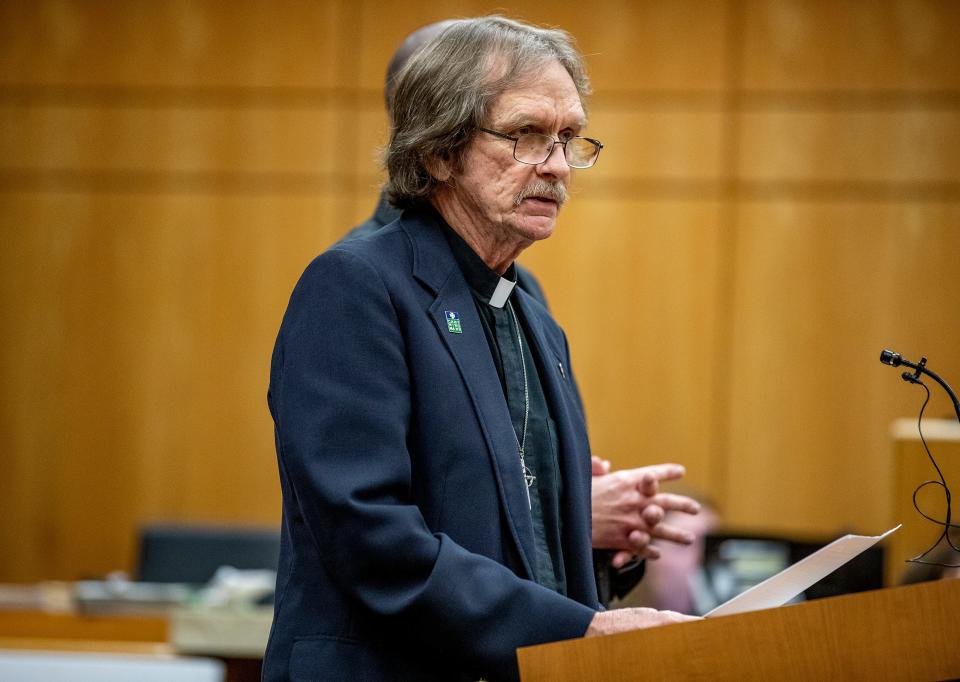
“She was a go-getter,” Yates said. “Edie had a brilliant mind .... She was a hard worker.”
Yates said Edie and David Henderson were “quite the team” as he listed their hotel projects in Plant City and their plans to redevelop The Terrace Hotel Lakeland.
GUILTY: Jury convicts Marcelle Waldon in 2020 murders of Edie and David Henderson
Will Henderson spoke about his father’s dedication for always making time on Wednesdays for father-son meals as well as frequent phone calls and travels together.
His father was a huge baseball fan and took Will Henderson to Detroit Lions and Tampa Bay Rays games.
After his father died, Will Henderson said he realized how hard his father had worked when he took over much of his father’s business interests.
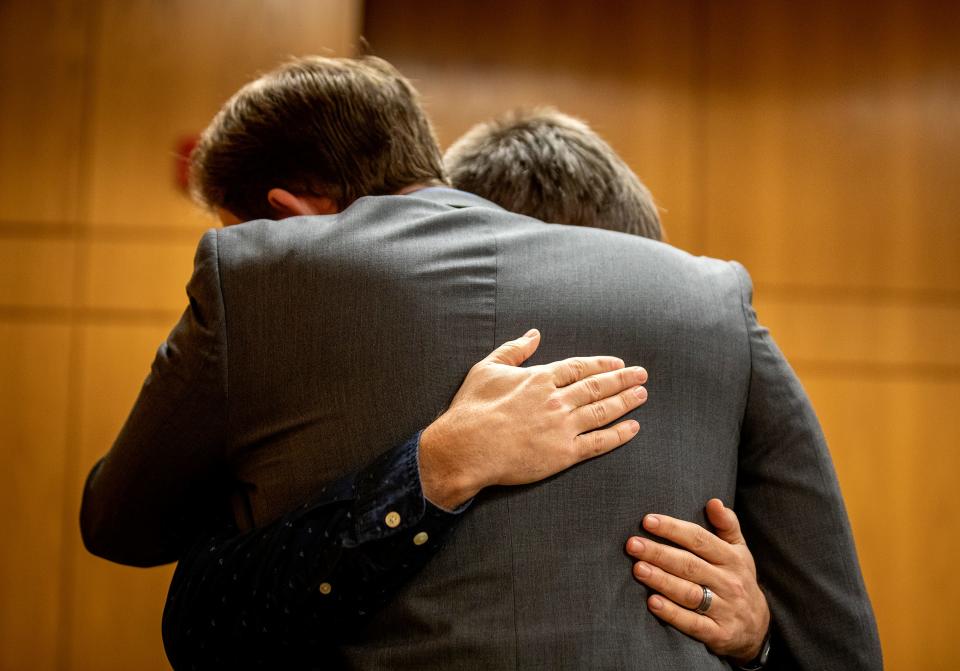
“He was a one-man band,” he said of all the banking and real estate development knowledge and experience his father had acquired and shared with him. By the time Will Henderson was 20 years old, he said he had more experience in real estate development than most people gain in a lifetime because of his father’s mentoring.
Further, he sorely missed his father's gift for storytelling and “tall tales.” And he catches himself often reaching for his phone expecting his father to be calling him even years after his death.
The jury could begin deliberations before noon Tuesday on their recommendation for death or life in prison for Waldon.
This article originally appeared on The Ledger: Marcelle Waldon declines to mount a defense to avoid death penalty

